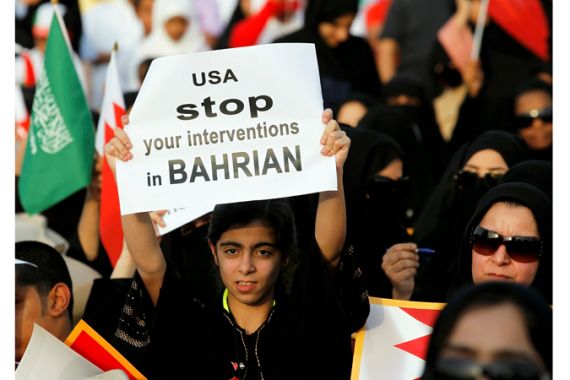Bahrain bans protests and gatherings
Gulf state’s decision expected to raise pressure on Shia Muslim organisations engaged in organising opposition marches.

Bahrain has imposed a ban on all protest gatherings and is threating legal action against groups considered backing escalating demonstrations and clashes.
The order, announced by the interior ministry on Tuesday, is the most sweeping attempt to crush the kingdom’s anti-government uprising since martial law rules went into effect during the early months of unrest last year.
Sheikh Rashid Al Khalifa, the interior minister, said “repeated abuse” of the rights to freedom of speech and expression
could no longer be accepted.
Now any protest would only be permitted only once security and stability were sufficient to maintain national unity.
The interior ministry said that any any “illegal rally or gathering would be tackled through legal actions against those calling for and participating in it”.
The decision will sharply increase pressure on political groups from Bahrain’s Shia Muslim majority, which has led the protests seeking a greater political voice in the Sunni Muslim-ruled Gulf state.
Fahad al Binali, a government spokesman, told Al Jazeera that there has been an escalation of violence during rallies and gatherings, resulting in the deaths of two police men.
“This is not an outright ban with no end in sight,” he said.
“But the line must be drawn at violence.”
This warning appeared aimed particularly at the largest Shia political bloc, Al-Wefaq, which has organised many opposition marches. Another rally is planned for Friday.
Hadi al-Musawi, an Al-Wefaq official, struck a defiant tone, calling the interior ministry order “against international human rights”.
Tougher steps against opposition groups could increase complications for the US and other Western allies that have stood by Bahrain’s monarchy during more than 20 months of unrest.
The US has important military bonds with Bahrain, which hosts the US Navy’s 5th Fleet, but it also has called
for increased efforts at dialogue to ease the tensions.
Shia Muslims comprise about 70 per cent of Bahrain’s 525,000 citizens, but claim they face systematic discrimination such as being denied top political and security posts.
The Sunni monarchy has made a series of concessions,including giving more powers to the elected parliament,but opposition groups say the reforms do little to loosen the ruling family’s hold on power.
More than 50 people have been killed in Bahrain’s unrest since February 2011.